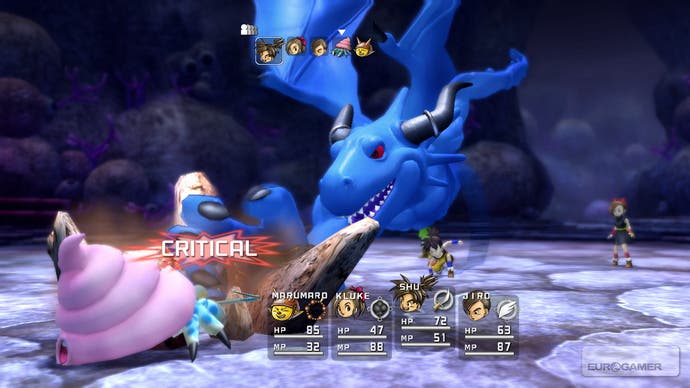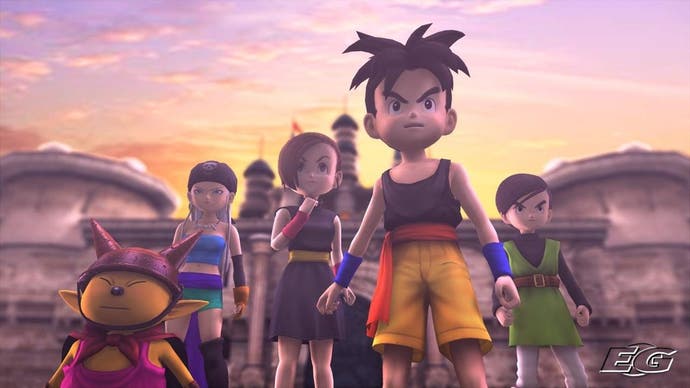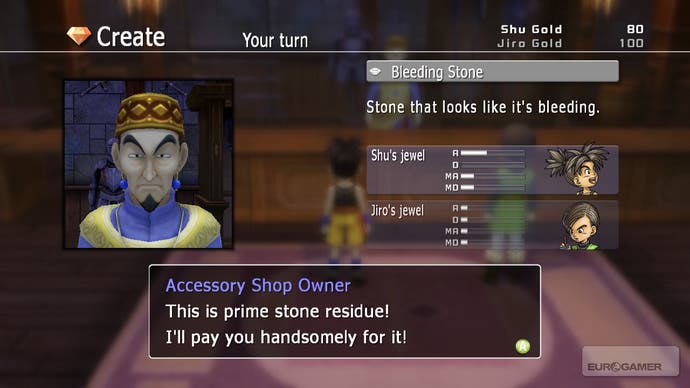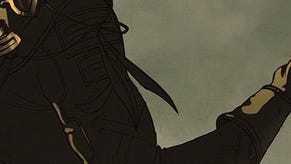Blue Dragon
It drags on and on.
What does work well, however, is the turn ordering implemented by the game. Many attacks can have their power boosted by stopping a progress bar at a specific point; leave it to fill up, and it'll take longer before the attack is carried out, but it'll be more powerful when it does happen. The position of enemy and friendly turns are indicated on this bar, so timing an attack perfectly in between the actions of others becomes quite an art.
Blue Dragon's other main combat system quirk is the ability to capture multiple enemies from the area around you into a single battle. To do this, you extend a circle around your character rather than walking into a single enemy - this adds every enemy group within range of the circle to the battle, which has the effect of creating "waves" of enemies for you to defeat.
This is a clever system, and a good way of clearing out large areas - but it's not quite the high-risk strategy you might imagine, because the game gives you significant power-up boosts between waves. Several waves into a battle, you'll be so powerful that you'll be sweeping enemies aside, not clinging on at the edge of your hitpoints and wondering if you bit off more than you can chew. Enemies in group battles like this will also often attack each other, making matters even easier - although this can be a clever strategy in itself, especially if you're in an area with two tough types of enemies which hate each other.
Deep Blue C

So, the combat system is entertaining enough, albeit not terribly challenging. It'll probably be a turn-off for anyone used to a little more strategy and action in their combat, as it's all terribly slow and ponderous by modern RPG standards, but that's the point to some extent, right? This is, after all, a heavily traditional RPG, designed as an homage to the past.
The problem with that approach is that Blue Dragon is trying to inspire nostalgia for something which we European gamers never experienced. Sakaguchi is trying to recapture the feeling of the early Final Fantasy games, and to a lesser extent, the early Dragon Quest games - which is probably exactly what you want for a rose-tinted retro trip if you're a thirty-something Japanese guy.
On the other hand, if you're a European gamer, you probably didn't play those games as a child - at most, you probably dived into Final Fantasy late in the day with US import copies of the SNES versions. You don't have childhood experiences of hours spent playing early JRPGs - and stripped of its nostalgic value, Blue Dragon just seems primitive, backwards and annoying.

Even Uematsu's music harks back to early Final Fantasy themes, rather than having any of the complexity of his later compositions; sadly, compared to the wonderful soundtracks regularly gracing games today, the music simply sounds dull.
Blue Dragon is more primitive, in many ways, than even FFV, and certainly doesn't have any of the complexity of FFVI. It's as if the last 15 years of progress in the genre never happened, and anyone who has experienced more recent iterations in series like Final Fantasy, Shin Megami Tensei, Shadow Hearts, the Tales franchise and their ilk will simply find Blue Dragon to be a very pretty but terribly outdated curiosity.
Of course, it's certainly one of the best JRPGs the Xbox has ever played host to. No doubt about that. Unfortunately, that's a completely meaningless phrase, a bit like saying that my dinner is the best dinner on my table, Gordon Brown is the best prime minister in Downing Street, and red is the best colour on Mars.
The sad fact is that if Blue Dragon had been released on the PS2, it would have sunk beneath the waves without a trace - written off as a strangely traditional game that had no appeal outside Japan. It's weak and primitive compared even to Akira Toriyama's last RPG outing, Dragon Quest VIII, which was already too primitive for European tastes and was a commercial flop in this territory; we can simply see no reason why anyone who wasn't enamoured with Dragon Quest would even want to consider playing Blue Dragon.

This feels like a lost opportunity. The talent of the three creators who collaborated on this title is unquestionable, and in some areas - the perfectly tuned, if rather shallow, difficulty curve, the absolutely delightful graphics and the occasional piece of inspired dungeon design - you can see the bones of a wonderful game showing through.
However, instead of making that game, these three past masters of the RPG genre clearly chose to go on a self-indulgent nostalgia trip to the games of their youth. In the process, they have made a game which serves as a very poor introduction to the genre for Xbox owners. It's by no means terrible; but without borrowing Sakaguchi's rose-tinted glasses, it's not much fun either.



